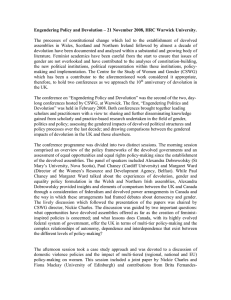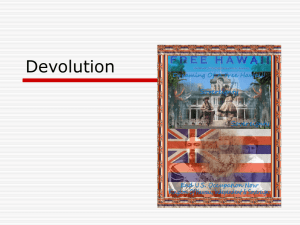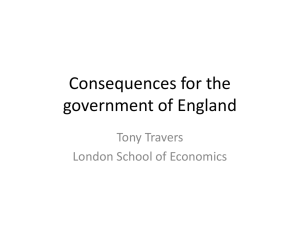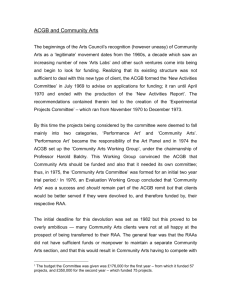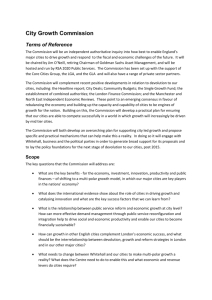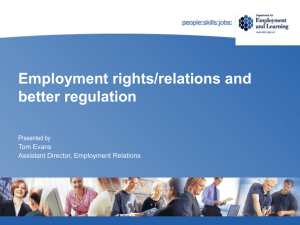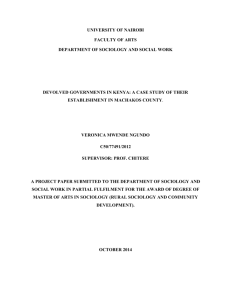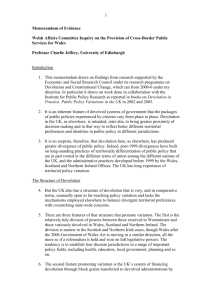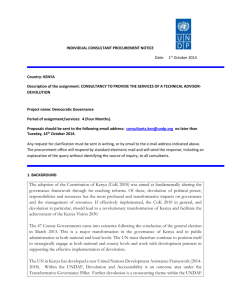Devolution: A Decade On - Politics and International Relations (PIR)
advertisement
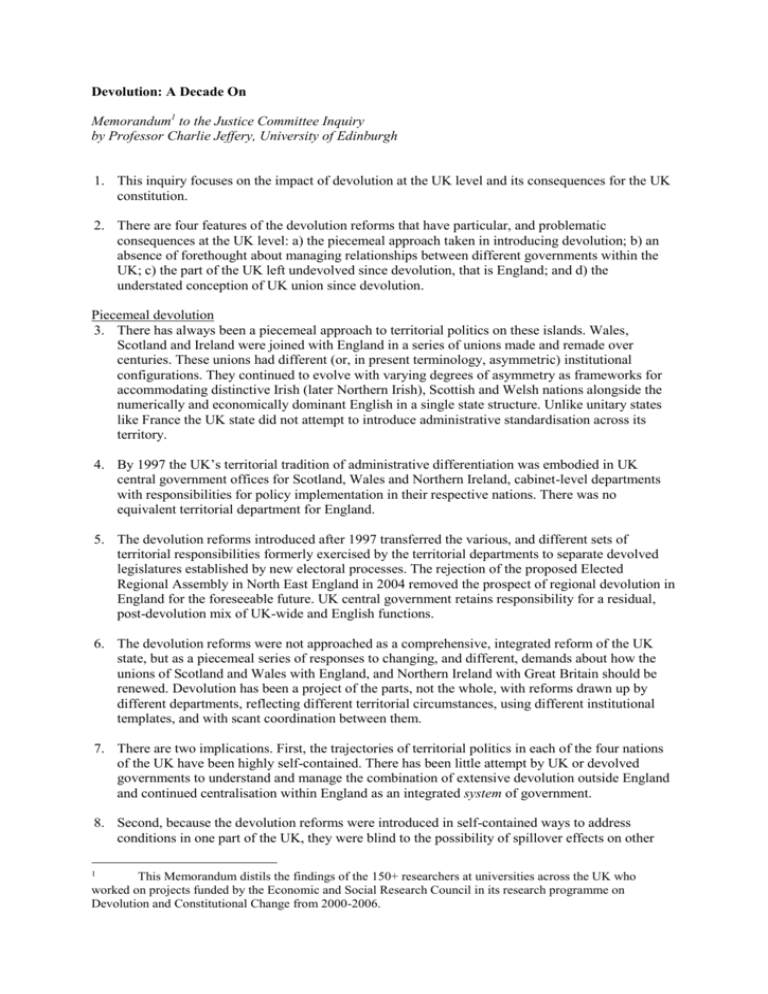
Devolution: A Decade On Memorandum1 to the Justice Committee Inquiry by Professor Charlie Jeffery, University of Edinburgh 1. This inquiry focuses on the impact of devolution at the UK level and its consequences for the UK constitution. 2. There are four features of the devolution reforms that have particular, and problematic consequences at the UK level: a) the piecemeal approach taken in introducing devolution; b) an absence of forethought about managing relationships between different governments within the UK; c) the part of the UK left undevolved since devolution, that is England; and d) the understated conception of UK union since devolution. Piecemeal devolution 3. There has always been a piecemeal approach to territorial politics on these islands. Wales, Scotland and Ireland were joined with England in a series of unions made and remade over centuries. These unions had different (or, in present terminology, asymmetric) institutional configurations. They continued to evolve with varying degrees of asymmetry as frameworks for accommodating distinctive Irish (later Northern Irish), Scottish and Welsh nations alongside the numerically and economically dominant English in a single state structure. Unlike unitary states like France the UK state did not attempt to introduce administrative standardisation across its territory. 4. By 1997 the UK’s territorial tradition of administrative differentiation was embodied in UK central government offices for Scotland, Wales and Northern Ireland, cabinet-level departments with responsibilities for policy implementation in their respective nations. There was no equivalent territorial department for England. 5. The devolution reforms introduced after 1997 transferred the various, and different sets of territorial responsibilities formerly exercised by the territorial departments to separate devolved legislatures established by new electoral processes. The rejection of the proposed Elected Regional Assembly in North East England in 2004 removed the prospect of regional devolution in England for the foreseeable future. UK central government retains responsibility for a residual, post-devolution mix of UK-wide and English functions. 6. The devolution reforms were not approached as a comprehensive, integrated reform of the UK state, but as a piecemeal series of responses to changing, and different, demands about how the unions of Scotland and Wales with England, and Northern Ireland with Great Britain should be renewed. Devolution has been a project of the parts, not the whole, with reforms drawn up by different departments, reflecting different territorial circumstances, using different institutional templates, and with scant coordination between them. 7. There are two implications. First, the trajectories of territorial politics in each of the four nations of the UK have been highly self-contained. There has been little attempt by UK or devolved governments to understand and manage the combination of extensive devolution outside England and continued centralisation within England as an integrated system of government. 8. Second, because the devolution reforms were introduced in self-contained ways to address conditions in one part of the UK, they were blind to the possibility of spillover effects on other 1 This Memorandum distils the findings of the 150+ researchers at universities across the UK who worked on projects funded by the Economic and Social Research Council in its research programme on Devolution and Constitutional Change from 2000-2006. parts of the UK. For example, devolution was introduced in Scotland in particular to restore for Scots the legitimacy of UK government. It has largely done so – but what we have seen in the last year or so is a growing sense in some parts of political, media and public opinion in England that Scottish devolution is unfair to the English, whether through patterns of representation at Westminster, the distribution of public spending, or other matters. Piecemeal devolution may solve one problem, but end up creating another. 9. We can anticipate that attempts to address these consequential English concerns in isolation rather than as part of a systematic reform of the UK state will also create spillover effects and consequential demands for further reform. The absence of systematic reform runs the risk of continued instability. Relationships between the Governments of the UK 10. The devolution of responsibilities from UK central government to new devolved institutions with their own electoral mandates transformed the territorial politics of the UK from a set of relationships between departments of a single UK government into a set of relationships between different governments. Arrangements for expressing and reconciling different territorial interests were largely projected forward from the pre-devolution era: collegial problem-solving by civil servants (though these are now responsible to different governments) supplemented where necessary by brokerage by ministers (though these are now members of different governments). 11. The implications of this new set of inter-governmental relationships were disguised for the period between 1999 and 2007 in which the Labour Party led governments at the UK level and in Scotland and Wales (and in which devolution in Northern Ireland was suspended or unstable). Since the round of devolved elections in spring 2007 these implications have become clear, especially in a number of public disputes between the UK and the Scottish governments. 12. Such disputes are a normal condition of politics when there are two levels of government with significant and overlapping responsibilities. In other states with multi-level government there are routinised techniques for dialogue and coordination between governments which act as shock absorbers in managing and resolving disputes. The UK’s arrangements for reconciling different territorial interests, inherited from the pre-devolution era and attuned to coordination within a single central government, appear unfit for purpose now that they connect governments led by different political parties. The English Problem 13. Recent debate has suggested that devolution outside of England is a problem for England. There is a reverse argument: that England, by its size and structure of government has problematic consequences for the operation of devolution outside of England. 14. England has around 85% of the UK’s population and gross domestic product. It is governed as a unitary territory by central government in Westminster and Whitehall. Those institutions combine and at times confuse their England-only with their UK-wide roles. Because of the weakness of the UK’s structures of inter-governmental coordination the devolved governments have little grip on these fused, ‘Anglo-UK’ institutions. 15. Within the framework of a UK single economic market, a single welfare state and a single internal security area, decisions taken by UK central government for England may have spillover effects which neglect, ignore or confound devolved interests. At times this has happened with wilful intent, but rather more often because the devolved nations lie very low on the radar of central government. Similarly the effects of decisions of UK government with a UK-wide reach at times do not take full account of their effects in devolved settings. 16. Spillover effects of decisions made in one jurisdiction into another are not unusual. They are typically managed in other states with multi-level government by processes in which central government acts as an arbiter. Yet because it is simultaneously the government of England, the UK’s government appears ill-suited to the role of arbiter of competing territorial interests. There is a risk that the UK-wide roles of UK government can become captured – because of its size and economic weight – by England’s territorial interests. What is the Union For? 17. The challenges posed by the piecemeal approach to devolution, by the new patterns of relationship between the governments of the UK, and by England’s weight vis-à-vis the rest of the UK can all be clustered under one overarching problem: the failure at the point of devolution or since to re-state what the UK as a whole, in its new, part-devolved format is for, what the role of the centre should be, how the centre should relate to the different nations, how the parts combine to make a whole. 18. There has been no general articulation of the balance of a UK-wide (and within that an English) collective interest and the collective interests that exist within the UK outside of England. As a result devolution lacks commonly understood, commonly accepted rules of the game which might offer a general rather than a piecemeal framework for accommodating distinctive nations in a single state, establish a framework of intergovernmental relations capable of identifying statewide objectives and balancing them against devolved autonomy, and conceptualise the government of England and connect it to government outside of England. 19. There would appear to be three broad directions in which further changes might unfold. A first would be to embed expressions of union more explicitly in the operation of the devolved state, for example in guarantees of minimum standards of public services across jurisdictions, commitments to solidarity across jurisdictions through territorial financial allocations by need, a more conscious distinction of English from UK roles in central government, and a system of inter-governmental coordination that gave the devolved governments real grip at the centre (for example in codefining minimum standards or obligations of solidarity). 20. A second direction of travel would be to enhance the autonomy of the devolved nations through greater legislative powers and/or greater fiscal autonomy together with a scaling down of the UKwide responsibilities of the UK government. In this scenario – which could, of course, be extended from special status within the UK to full independence for one or more of the nations outside England – it would need to be borne in mind that England’s size and economic weight would still cause significant spillover effects on the other nations. 21. A third possibility would be to introduce incremental adaptations of the current arrangements on a case-by-case basis, in other words ‘muddle through’ and avoid any systematic review of the spillovers and imbalances of the post-devolution UK state. That possibility does not appear the most promising basis on which best to address the question of how – and whether – the UK can continue to accommodate its multinational heritage within a shared state.
